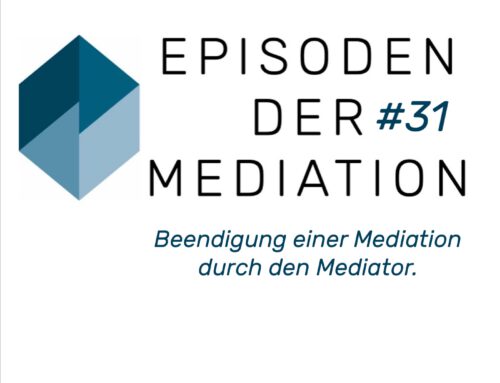The evaluative mediation style (2/4) – The legality of evaluative mediation activities
German mediation law also permits evaluative mediation activities
Blog series on evaluative mediation
- Evaluative mediation services. Evaluative and proven activities of mediators in mediations
- Legality of evaluative mediation activities.
- Mediation appropriateness of evaluative mediation activities. Mediation principles as a framework for evaluative mediation services.
- Opportunities and risks of evaluative mediation services. Do it!
Introduction
Evaluative mediation services, as I explained in the first part of this short series, can be condensed into four activities:
- represent guard rails within which the closing agreements must operate
- Correcting the conflict parties' misconceptions about guard rails
- Present solutions (show ways forward)
- Present ideas for solutions - make suggestions (identify goals)
To what extent these activities in mediations are lawful – in view of the German Mediation Act – will be explained in the following blog post.
European Directive 2008/52 EC
The German Mediation Act came into force as Act on the Promotion of Mediation and Other Forms of Extrajudicial Conflict Resolution in force on 26 July 2012.
However, as early as 1999, the European Council called on its member states - including Germany - to standardise alternative dispute resolution procedures by law. As a result, Austria introduced a mediation law for civil law matters in 2003. However, other countries did not follow suit. A corresponding EU directive (2008/52/EC) was therefore issued on 21 May 2008, which obliged the member states to formulate national provisions. However, this directive related exclusively to cross-border matters. Germany saw the implementation of this directive as an opportunity not only to regulate cross-border cases, but also to establish out-of-court dispute resolution methods for national matters. However, this led to delays, with the result that the German Mediation Act was only signed by the Federal President on 21 July 2012 and officially came into force a week later.
The European Directive 2008/52 EC is the basis and historical starting point for the question of how the legal basis for mediation should be understood.
The complete Directive 2008/52 EC is available in German here viewable.
The Directive defines the terms "mediation" and "mediator" in Article 3 of Directive 2008/52 EC. "Mediation is a structured procedure independent of its Term in which two or more parties to a dispute are mediated with the help of a mediator. on a voluntary basis to try to reach an agreement on the settlement of their Achieving disputes".
Note: The European Code of Conduct for Mediatorswhich was adopted by the European Commission in 2004, has already explained this formulation in its preliminary remarks. The Directive adopts this wording word for word.
The Code of Conduct is original here (E-Justice Europe) and here (Centre for Mediation) viewable and downloadable – and in German translation here.
The decisive factor is – unsurprisingly – the Right to self-determination of the conflict partieswho negotiate in mediation. They and their wishes are decisive for the limits of permitted mediation activities. A mediator, it can already be stated here, may not act against the will of the parties to the conflict or mediation.
The counterpart here is the statutory judges.
- On the one hand its decision is binding on the parties to the dispute even if they do not agree with the content.
- On the other hand, the difference is even more evident in the fact that one of the two court parties was subjected to this judicial decision-making power even against its will in these state court proceedings! This is because only one party needs to bring an action against the other party before the court – and then the other „has been dragged before the cadi“. This limitation of the defendant's right to self-determination, which is admittedly desirable in view of the principle of the rule of law, is, so to speak, the „absolute counterpart“ to the mediation procedure.
In this context, if we consider the Figure of the referee If we consider an arbitration tribunal that both parties to the dispute have voluntarily and independently selected and that has the power to make binding decisions, it becomes clear what the provision in Art. 3a para. 2 of the Directive means: "It includes mediation by a judge who does not have jurisdiction to hear the dispute is. This does not include efforts to resolve the dispute by the court or judge seised during the legal proceedings concerning the dispute in question".
Procedural reference
According to the European understanding of the directive, mediation does not exist if the statutory judge decides on the matter in state court proceedings, even if, for the sake of clarity, he acts in a benevolent, empathetic, impartial, neutral and independent manner and endeavours to reach an amicable settlement
On the other hand, the Directive also makes it clear that mediation can still take place even if the dispute is heard by an arbitral tribunal(!) and thus of course also by an arbitrator or mediator, regardless of their stylistic orientation.
Role and task reference
The Directive refers to the mediator in Art 3 b) as follows: „"Mediator" [means] a third person who is requested to conduct a mediation in an effective, impartial and competent manner, irrespective of his or her title or profession in the Member State concerned and of the manner in which he or she has been appointed or entrusted to conduct the mediation;
Here, too, there is no recognisable limitation to a particular style of mediation; mediators are not authorised to decide on the matter, even if they are supposed to act in an expert manner, but it is not ruled out that they can be assigned this authorisation by the parties to the conflict by mutual agreement and on their own responsibility.
European law in any case does not preclude mediators from acting in an evaluative manner, be it through
a) Presentation of guard rails within which the closing agreements must operate,
b) Correcting the guard rails of misconceptions of the conflict parties,
c) Presentation of possible solutions (showing ways forward) or
d) the presentation of ideas for solutions and thus the submission of concrete proposals for solutions (identifying objectives)…,
with which the parties to the conflict can then continue to work.
German mediation law
The starting point of German mediation law is the belated in force on 26 July 2012 kicked "Law on the promotion of out-of-court mediation". This law is a so-called article law in which, on the one hand Article 1 codifies the Mediation Act with its nine sections and on the other hand in Article 2, in addition to the amendment of procedural provisions, among other things, the Property judge in the Code of Civil Procedure was introduced. For its part, the Mediation Act then formed the basis for the Training regulation Certified mediators.
Mediation Act
§ Section 1 (1) MediationsG regulates the term mediation.
Mediation is therefore "a confidential and structured procedure in which parties voluntarily and independently endeavour to reach an amicable settlement of their conflict with the help of one or more mediators."
This definition contains no limitations for any mediation styles or models. Even the term „self-responsible“ does not imply that evaluative measures by mediators are excluded, unless one is of the opinion that expressions of opinion limit or even exclude the self-responsibility of others. But if that were true, I wouldn't be able to argue against it on my own responsibility. Or to put it another way: The concept of personal responsibility is only coherently conceived (and to be taken seriously) if one does not take the view that expressions of opinion by mediators, who are also in a contractual employment relationship with the parties to the conflict, cannot in principle lead to the parties to the conflict losing their personal responsibility or only being able to exercise it to a limited extent. If this were to be followed, then even contractual rights such as cancellation, withdrawal and consideration could not be effectively exercised as an exercise of existing personal responsibility.
The wording "autonomous" is a clear legislative commitment that the private autonomy of the parties is respected and that mediation as a procedure and decision-making method is an expression of this autonomy. Private autonomy and personal responsibility are the vanishing point of mediation, the starting and ending point of all proceedings organised by the mediator. For it is with the mediator's help – legal phrase "with the assistance of one or more mediators" – that the parties to the conflict endeavour to find a solution. This assistance and support, as the legislator wishes it to be understood, is by no means limited to being there, to benevolent, reflective, emphatic support, but can also include further-reaching support services. Support services are all eligible support serviceswhich do not amount to an appropriation of the power to solve the problem and are not driven by the will to find and implement the solution, even against the will of the conflict parties if necessary. In this way, a distinction could be made between the question of what „with the help of mediators“ as opposed to conflict solutions that „were created by mediators“.
§ Section 1 (2) MediationsG standardises the term mediator.
The mediator is a "neutral and independent person without decision-making authority".
The consequence of this formulation is that an arbitrator (= private law basis for work!) may not be categorised as a mediator or that an arbitrator appointed under private law may not be used as a mediator in a parallel, upstream or downstream mediation procedure in the same matter at the same time. This corresponds to a narrower understanding of the concept of mediator than European law. However, nothing further can be inferred for the assessment in question here.
However, Section 2 (3) sentence 3 Mediation Act is also important for the present context.
This standard clarifies that the mediator may conduct individual discussions with the parties to the conflict/mediator with their consent – and that this in no way excludes the mediation character.
It could now be argued that one-to-one meetings are controversial among mediators. It could also be pointed out that mediators who fundamentally reject evaluative mediation services also take a critical view of such one-to-one meetings as an intervention option or even reject them outright (e.g. Friedman/Himmelstein). For those in favour of an evaluative style of mediation, however, one-to-one meetings are part of the usual intervention repertoire. And if the Mediation Act, so the argument goes, allows one-to-one meetings, then this shows that the Mediation Act is open to evaluative activities, doesn't it?
However, it could also be concluded from the legal system that if the Mediation Act explicitly names and standardises this one „evaluation-related“ form of intervention, then conversely this means that other, more extensive evaluation services should remain excluded.
In short, nothing can be inferred from the legal norm of individual interviews alone for the question of the legality of evaluative activities as a whole.
At a distance, however, the following becomes clear: The Mediation Act is generally very abstract and – explicitly explained in the legal materials – formulated open to development has been made: It is precisely not the purpose (and thrust) of the Mediation Act to favour or exclude one style of mediation. The Mediation Act is not a set of rules that has arisen out of necessity and imposes a corset to put an end to undesirable excesses, but aims to facilitate mediation and provide a legal framework in which as many people as possible can find themselves and test and expand mediation.
The following considerations should therefore be decisive for evaluation services as mediation services:
What is personal responsibility and how is it conceptualised?
- Can't the request for evaluative help, whose contributions are critically scrutinised and processed appropriately for one's own problem perception and solution prognosis, show personal responsibility instead of seeing it as a threat to it?
- Can personal responsibility also develop from opinions and recommendations instead of only seeing dangers and risks for personal responsibility in them?
- Can the request for a solution approach not be an expression of personal responsibility or does personal responsibility mean that solution approaches must be withheld and the conflict parties (must) also be left to their own devices in mediation?
- Can a court action and the decision to deal with the conflict problem in court not also be seen as a responsible decision that takes responsibility for the uncertainties and assumes responsibility for the court judgement that one has approached on one's own responsibility? Even the defendant can, in principle, face the court proceedings on his own responsibility if he is allowed (and expected) to do so.
- Or, to put it another way, it is tantamount to a grossly pejorative simplification to vilify court parties as onlookers in conflict resolution, instead of allowing room for the possibility that they are delegates with their own responsibility who leave the decision in the dispute to impartial parties who can and should take a closer look at the common good.
Expert judge model, Section 278 (5) ZPO
Until the Mediation Act was passed in 2012, the court landscape was littered with model projects on mediation and consensual dispute resolution. The nationwide agreement on the so-called conciliation judge, as it then found its way into civil procedure law, was also one of the reasons why the implementation of the EU directive had been protracted. The compromise stipulated that arbitrators could use the method, not the procedure (!) of mediation to reach an amicable settlement. This also clarified that arbitrators are not subject to the (personal) requirements of the Mediation Act.
The revised Section 278 (5) ZPO states that: "The court may refer the parties to a judge designated for this purpose and not authorised to make decisions (arbitrator) for the conciliation hearing and for further attempts at conciliation. The arbitrator may use all methods of dispute resolution, including mediation."
(…But he is not subject to the regulations of the Mediation Act…)
Certified Mediator Training Ordinance - ZMediatAusbV=
On the basis of § 6 Mediation Act 21 August 2016 the ZmediatAusbV enacted. To the 1 September 2017 it came into force.
According to § 2 Para. 3 ZMediatAusbVO, a catalogue of training subjects will be decisive for the content of the training, which by its very nature should form the basis of mediation practice. There is also no commitment to a specific style of mediation or a corresponding rejection in this regulation or in this catalogue of content to be taught.
Rather, this catalogue is also based on an extremely broad concept of mediation options. Both individual discussions and shuttle mediation itself are provided for. This means that meeting at a table does not even have to be the aim in order for the procedure to be defined as mediation. This is seen differently in some cases on the basis of the law (e.g. R. Greger, Kommentar zum MediationsG, Beck-Verlag).
CONCLUSION
It should be noted that the German Mediation Act and (even more so) European mediation law do not set any limits, so that evaluative mediation efforts in a conflict resolution would not be declared lawful.
Evaluative mediation efforts in the form of
- Present guidelines for the scope of solutions
- Present possible solutions (ways)
- Identify approaches and ideas for solutions and possible goals
are not unlawful, but permitted by law.
The extent to which they are appropriate for mediation and the extent to which they can be implemented wisely and in a way that reinforces the principles of mediation will be discussed in the third part of this short series.






Leave A Comment